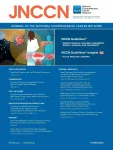(Press-News.org) PLYMOUTH MEETING, PA [January 13, 2021] -- New research in the January 2021 issue of JNCCN--Journal of the National Comprehensive Cancer Network finds more than a third of eligible people miss timely screening tests for colorectal cancer and at least a quarter appear to miss timely screening tests for breast and cervical cancers. The study comes from the University of Alberta, Faculty of Medicine and Dentistry in Alberta, Canada, with findings based on self-reported results from the Canadian Community Health Survey (CCHS) from 2007-2016. According to the author, the results also point to evidence of screening disparities being linked to lower socioeconomic status and identifiable minority race--echoing a similar study conducted in the United States by the Centers for Disease Control.[1]
"We already have high-quality evidence showing that recommended cancer screening saves lives. From a cost perspective, it is far cheaper to have an efficient cancer screening program and lower cancer-specific mortality than to have a high incidence of advanced incurable cancers that would cost the system much more--not to mention the lost opportunities for healthy, cancer-free individuals to work and contribute to the economy," said Omar M. Abdel-Rahman Abdelsalam, MBBCh, MSc, MD, Assistant Professor of Medical Oncology, University of Alberta. "These findings show we need more measures to eliminate socioeconomic-related health disparities in our communities, even where healthcare is publicly funded. The most powerful intervention to improve screening rates would be to invest more in primary care and make sure every individual is linked to a family physician who can track their adherence to recommended screening tests."
Dr. Abdel-Rahman looked at self-reported data for 99,820 people eligible for colorectal cancer screening, 59,724 people eligible for breast cancer screening, and 46,767 in the cervical cancer screening cohort, based on Canadian guidelines from 2007 through 2016. 43% did not have a timely screening test for colorectal, 35% did not have timely mammography, and 25% did not have a timely PAP smear. There were modest increases in screening compliance throughout the study's duration according to self-reporting within the survey.
"Dr. Abdel-Rahman's study adds to the literature showing that decreased levels of adherence to common cancer screening practices are associated with social and economic disparities," commented Mark Helvie, MD, Director, Breast Imaging Division, University of Michigan Rogel Cancer Center, Vice-Chair, NCCN Guidelines® Panel for Breast Cancer Screening and Diagnosis, who was not involved with this research. "Colorectal cancer screening had the lowest compliance with over a third reporting not being screened. While important differences exist between the NCCN Guidelines for screening and the Canadian screening guidelines--especially regarding colonoscopy and initiation and frequency of mammography--they all agree there is a need for more targeted efforts, research, and education to understand and improve compliance among all individuals, as illustrated by this study's results."
The research data does not include any impact from the COVID-19 pandemic. However, the publication is particularly timely as doctors report concerning drop-offs of screening numbers, which are projected to possibly result in thousands of excess cancer deaths over the next ten years.[2] The study further highlights how economic and racial disparities contribute to unequal health outcomes and showcases the need for interventions that go beyond coverage for health services alone.
INFORMATION:
To read the entire study, visit JNCCN.org. Complimentary access to "Patterns and Trend of Cancer Screening in Canada; Results from a Contemporary National Survey" is available until April 10, 2021.
[1] Hall IJ, Tangka FK, Sabatino SA, Thompson TD, Graubard BI, Breen N. Patterns and Trends in Cancer Screening in the United States. Prev Chronic Dis 2018;15:170465. DOI: http://dx.doi.org/10.5888/pcd15.170465
[2] Sharpless, Norman E., COVID-19 and cancer, 2020, https://science.sciencemag.org/content/sci/368/6497/1290.full.pdf
About JNCCN--Journal of the National Comprehensive Cancer Network
More than 25,000 oncologists and other cancer care professionals across the United States read JNCCN--Journal of the National Comprehensive Cancer Network. This peer-reviewed, indexed medical journal provides the latest information about innovation in translational medicine, and scientific studies related to oncology health services research, including quality care and value, bioethics, comparative and cost effectiveness, public policy, and interventional research on supportive care and survivorship. JNCCN features updates on the NCCN Clinical Practice Guidelines in Oncology (NCCN Guidelines®), review articles elaborating on guidelines recommendations, health services research, and case reports highlighting molecular insights in patient care. JNCCN is published by Harborside. Visit JNCCN.org. To inquire if you are eligible for a FREE subscription to JNCCN, visit http://www.nccn.org/jnccn/subscribe.aspx. Follow JNCCN on Twitter @JNCCN.
About the National Comprehensive Cancer Network
The National Comprehensive Cancer Network® (NCCN®) is a not-for-profit alliance of leading cancer centers devoted to patient care, research, and education. NCCN is dedicated to improving and facilitating quality, effective, efficient, and accessible cancer care so patients can live better lives. The NCCN Clinical Practice Guidelines in Oncology (NCCN Guidelines®) provide transparent, evidence-based, expert consensus recommendations for cancer treatment, prevention, and supportive services; they are the recognized standard for clinical direction and policy in cancer management and the most thorough and frequently-updated clinical practice guidelines available in any area of medicine. The NCCN Guidelines for Patients® provide expert cancer treatment information to inform and empower patients and caregivers, through support from the NCCN Foundation®. NCCN also advances continuing education, global initiatives, policy, and research collaboration and publication in oncology. Visit NCCN.org for more information and follow NCCN on Facebook @NCCNorg, Instagram @NCCNorg, and Twitter @NCCN.
WHAT:
Salmonella enterica serovar Typhimurium bacteria (S. Typhimurium) commonly cause human gastroenteritis, inflammation of the lining of the intestines. The bacteria live inside the gut and can infect the epithelial cells that line its surface. Many studies have shown that Salmonella use a "run-and-tumble" method of short swimming periods (runs) punctuated by tumbles when they randomly change direction, but how they move within the gut is not well understood.
National Institutes of Health scientists and their colleagues believe they have identified a S. Typhimurium protein, McpC ...
Research into the neuronal basis of emotion processing has so far mostly taken place in the laboratory, i.e. in unrealistic conditions. Bochum-based biopsychologists have now studied couples in more natural conditions. Using electroencephalography (EEG), they recorded the brain activity of romantic couples at home while they cuddled, kissed or talked about happy memories together. The results confirmed the theory that positive emotions are mainly processed in the left half of the brain.
A group led by Dr. Julian Packheiser, Gesa Berretz, Celine Bahr, Lynn Schockenhoff and Professor Sebastian Ocklenburg from the Department of Biopsychology at Ruhr-Universität Bochum ...
(Boston)--Researchers from Boston University School of Medicine (BUSM) provide a new genomics resource that details the small RNA transcriptomes (gene expression) of four bio-medically important mosquito species.
This is the first study to provide a platform for biologists to compare the characteristics of these small RNAs between these four mosquitoes as well as the most widely used insects for genetic experiments, the fruit fly, Drosophila. Although previous studies looked at each of the individual mosquito species separately, this study is the first to allow comparisons between all four species.
"Although ...
As anxious passengers are often reassured, commercial aircrafts can easily continue to fly even if one of the engines stops working. But for drones with four propellers - also known as quadcopters - the failure of one motor is a bigger problem. With only three rotors working, the drone loses stability and inevitably crashes unless an emergency control strategy sets in.
Researchers at the University of Zurich and the Delft University of Technology have now found a solution to this problem: They show that information from onboard cameras can be used to stabilize the drone and keep it flying autonomously after one rotor suddenly gives out.
Spinning like a ballerina
"When one rotor fails, the drone begins to spin ...
A recent Point of Reference article, "The meat of the matter: Environmental dissemination of beef cattle agrochemicals," published in Environmental Toxicology and Chemistry, points at synthetic chemical cocktails being emitted from cattle feed yards into the environment and how they can impact our ecosystem and our health.
Industrial meat production facilities have a bad reputation for their impact on the environment. Concentrated animal feeding operations (CAFOs) are known to release greenhouse gases related to global warming and for discharge of manure to watersheds, which affects water quality. A less publicized impact of modern beef production is the excessive use of ...
Our immune system is never idle. Their task is to detect and eliminate invasive pathogens, and they have no time to lose. The adaptive immune system identifies infectious organisms by recognizing foreign proteins on the surfaces of bacteria, viruses and unicellular protozoans. The interaction of these antigens with immune cells triggers a series of downstream events, which in most cases leads to the elimination of the pathogen.
But pathogenic organisms have developed strategies that enable them to escape detection by the immune system, and the strategies employed by remotely related organisms are often remarkably similar to each other. One way of confusing the immune system is to increase the structural heterogeneity of the antigens it encounters. ...
(Philadelphia, PA) - Like a failing fuel pump that causes a loss of engine power in a car, a diseased heart can take a serious toll on the body's performance. For some patients, tasks like walking up a flight of stairs or walking across a room eventually turn into exhausting endeavors. This is because, over time, regardless of the underlying cause, heart damage typically progresses, owing to a constant barrage of oxidative stress and toxic lipids that alter heart cell energetics and, ultimately, the ability of the heart to function normally.
Oxidative stress occurs when harmful oxygen-containing molecules outnumber helpful antioxidants, leading to damaging reactions with proteins, DNA, and other cell components. ...
New data released this week by Australian researchers reveals the impact of the COVID-19 lockdown period on aeromedical retrievals in rural and remote regions.
Researchers say while the social isolation measures led to a reduction in overall aeromedical activity during the lockdown in 2020, once the restrictions were lifted, evacuations increased significantly.
These findings are published in the Internal Medicine Journal, comparing aeromedical evacuation trends in Australia during the pre-restriction, lockdown and post-restriction periods last ...
A Simon Fraser University study on public perceptions of police officers wearing personal protective equipment (PPE) during the current pandemic finds that most PPE renders positive perceptions of police, while some equipment, including full-face respirator masks, may be viewed more negatively. The research was published January 9 in the Journal of Experimental Criminology.
Led by SFU criminology assistant professor Rylan Simpson and MA student Ryan Sandrin, the online experimental study drew on a sample of 117 participants residing in North America. The participants were randomly assigned to read one of three fictitious news articles that were either pro-PPE (highlighting health benefits), neutral or anti-PPE (lacking health benefits). Participants were then asked to rate 12 ...
The Granzyme B (GzmB) enzyme, which accumulates in certain tissues as we age, has been identified as a driver of itchy and sometimes life-threatening autoimmune conditions known as pemphigoid diseases (PDs), which cause blistering and skin erosion below the skin's surface.
New research led by University of British Columbia (UBC) and Vancouver Coastal Health Research Institute (VCHRI) scientists has found that a gel containing a specific and potent inhibitor of GzmB activity, VTI-1002, resulted in significant improvements on skin affected by PDs.
"Blisters caused by these conditions can be extremely discomforting, unsightly and ...



